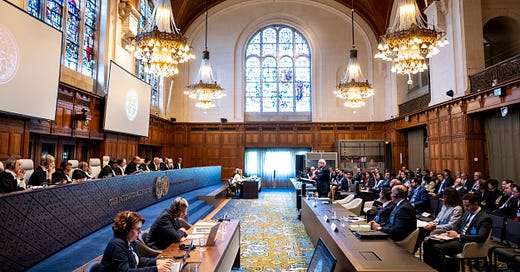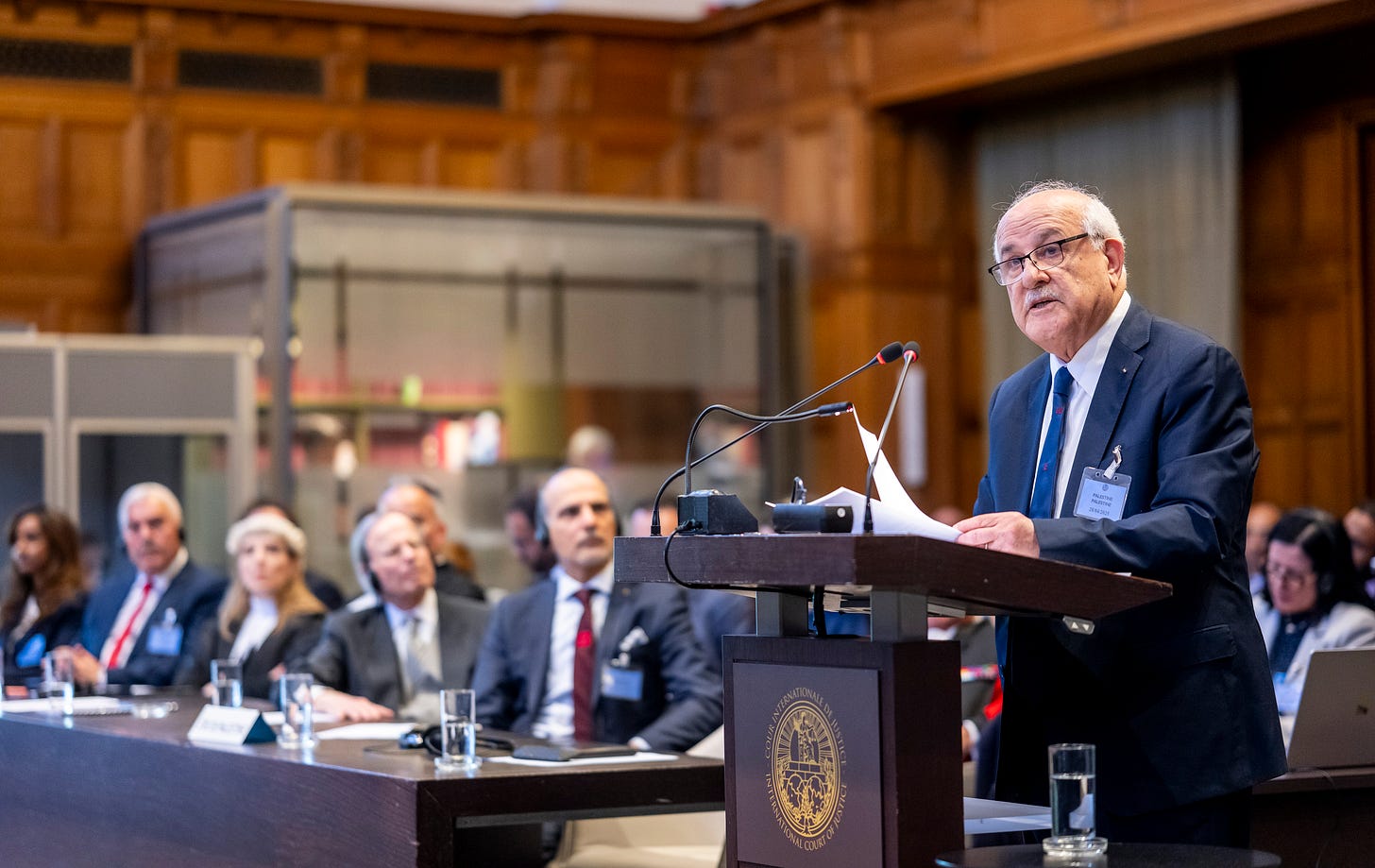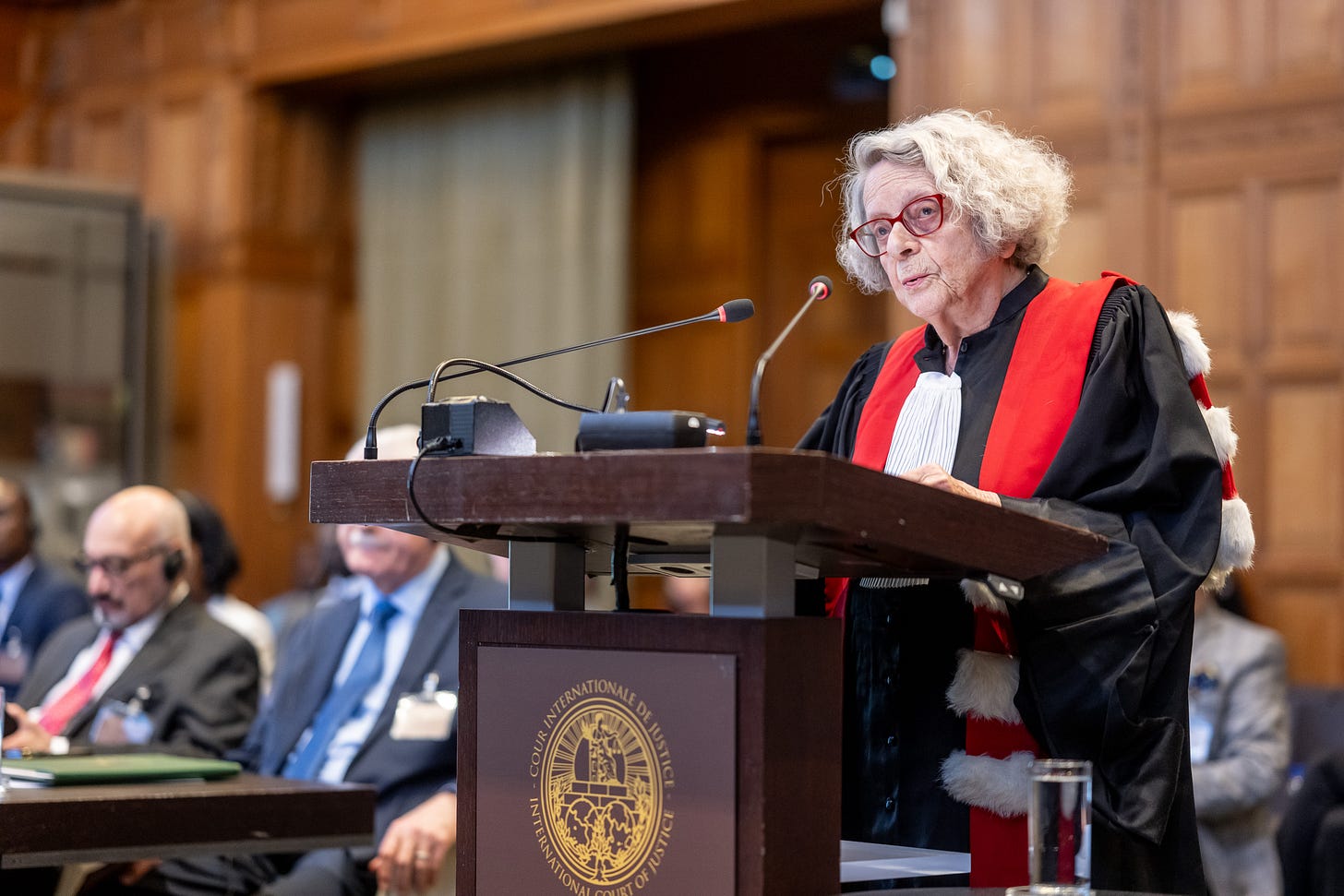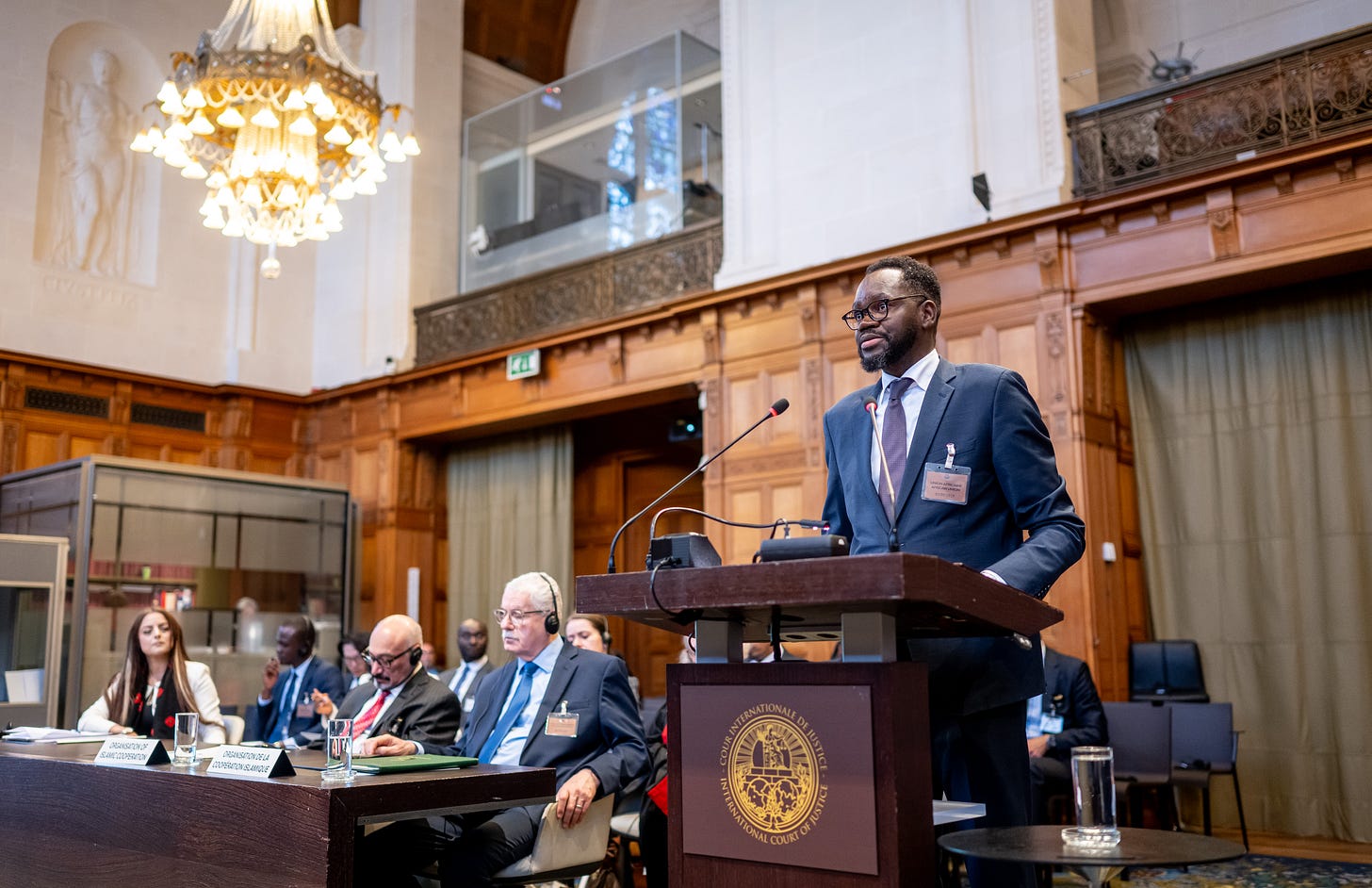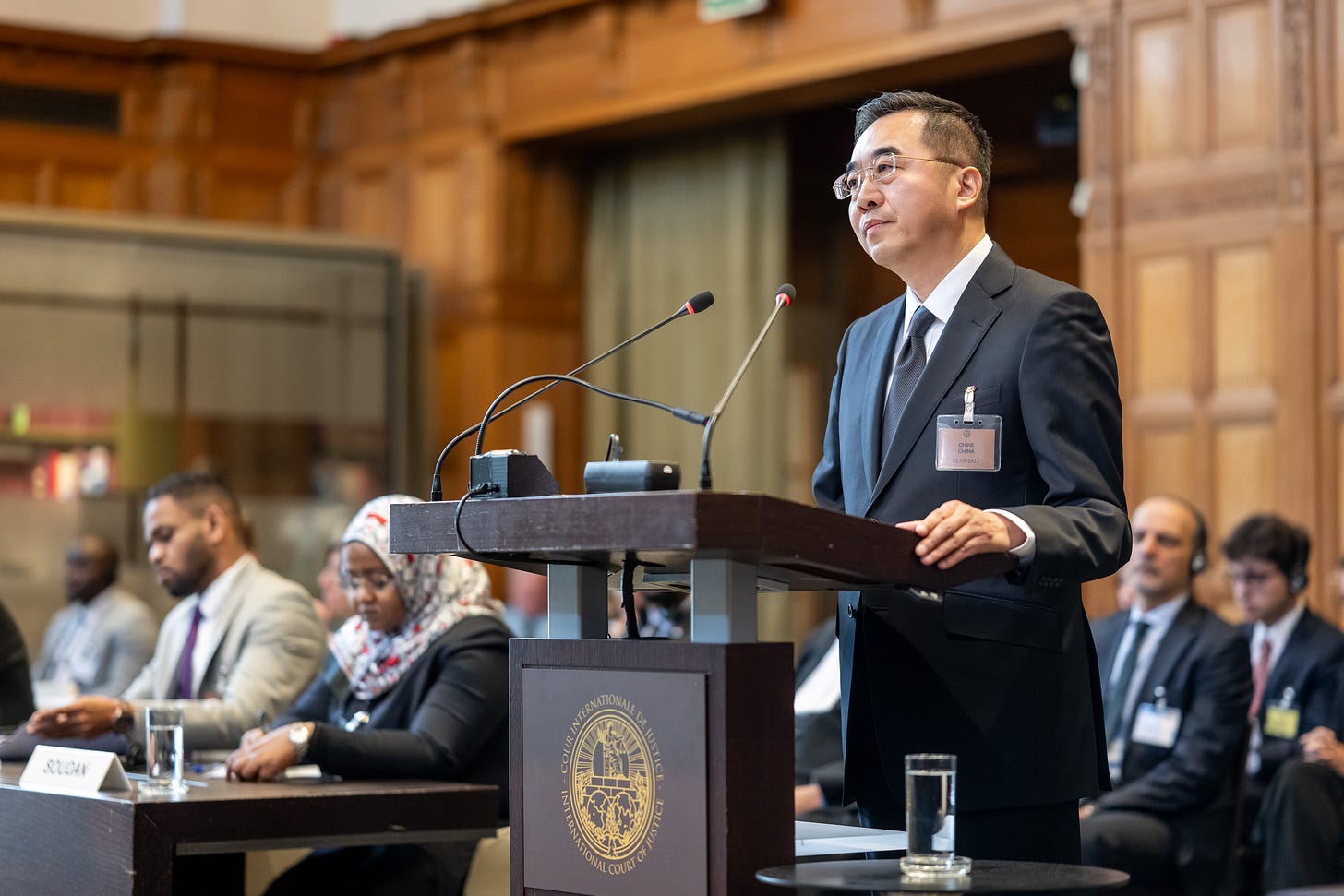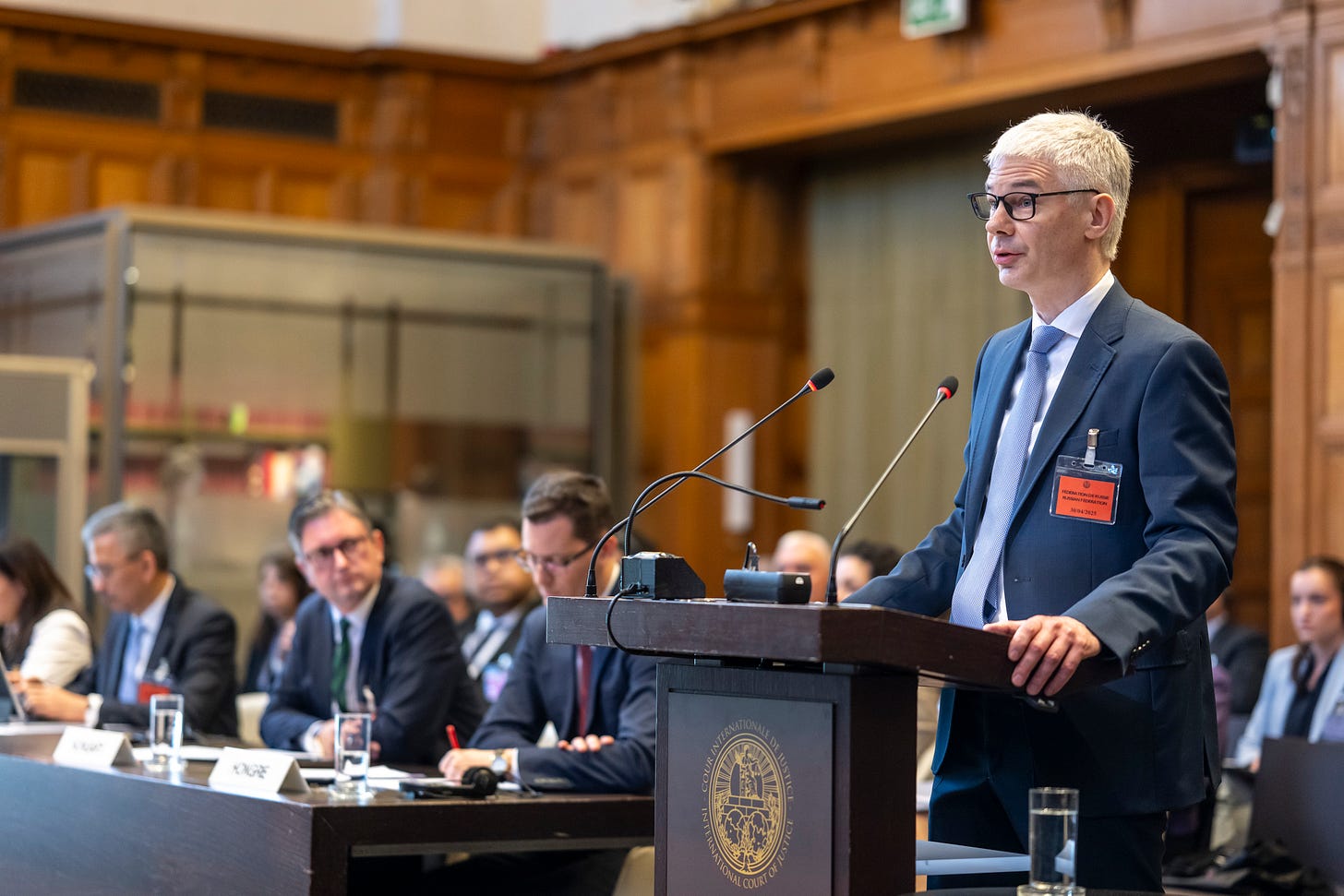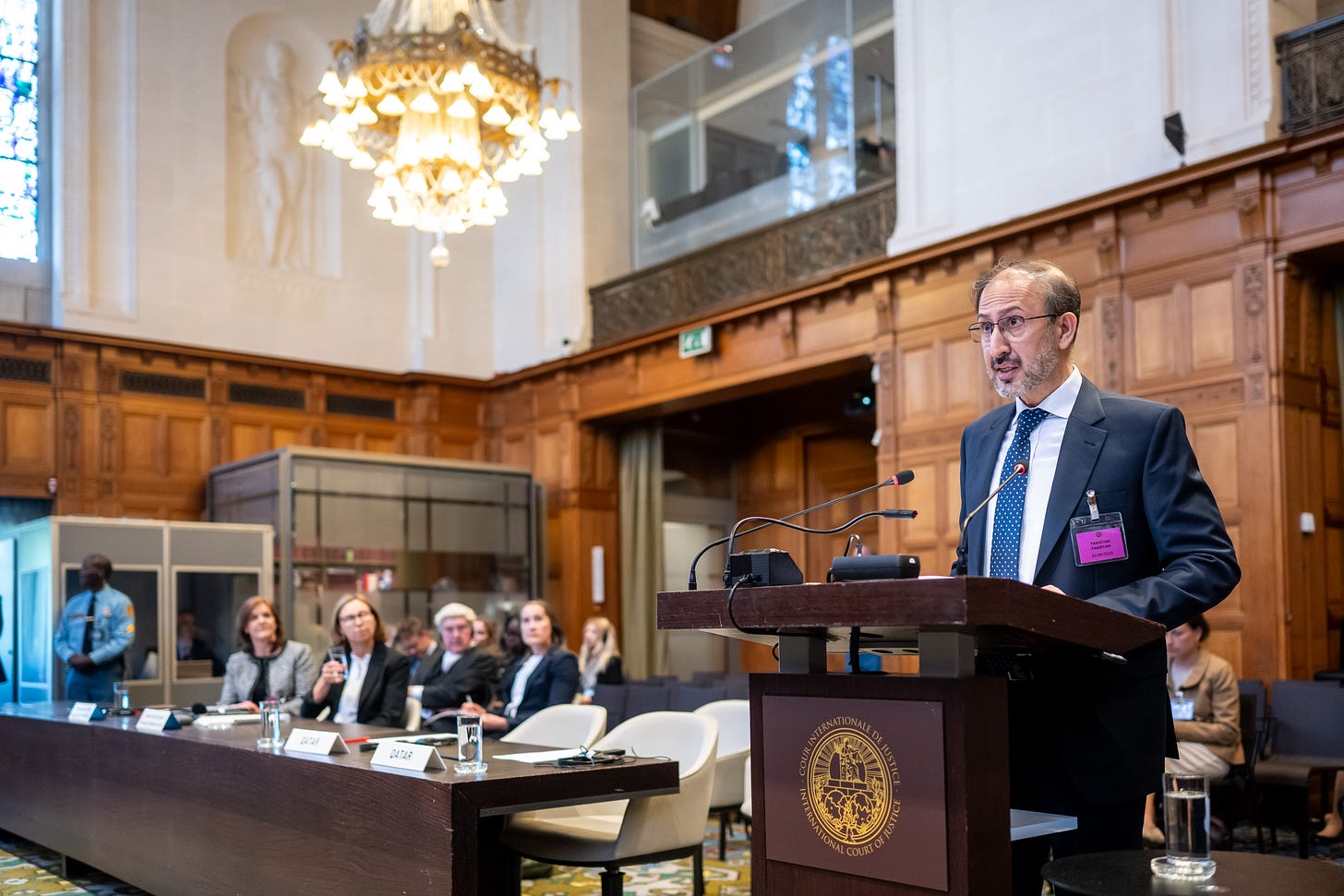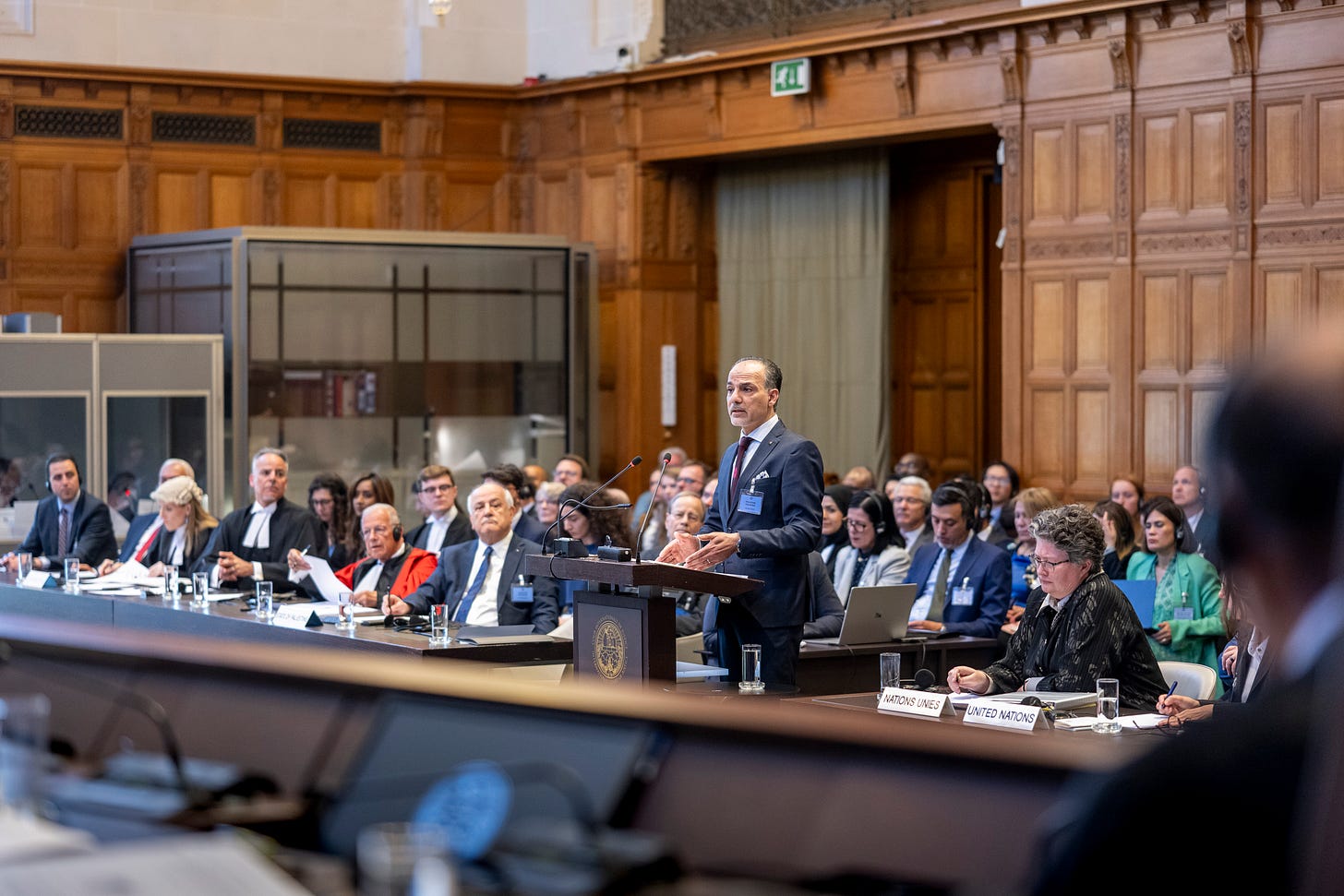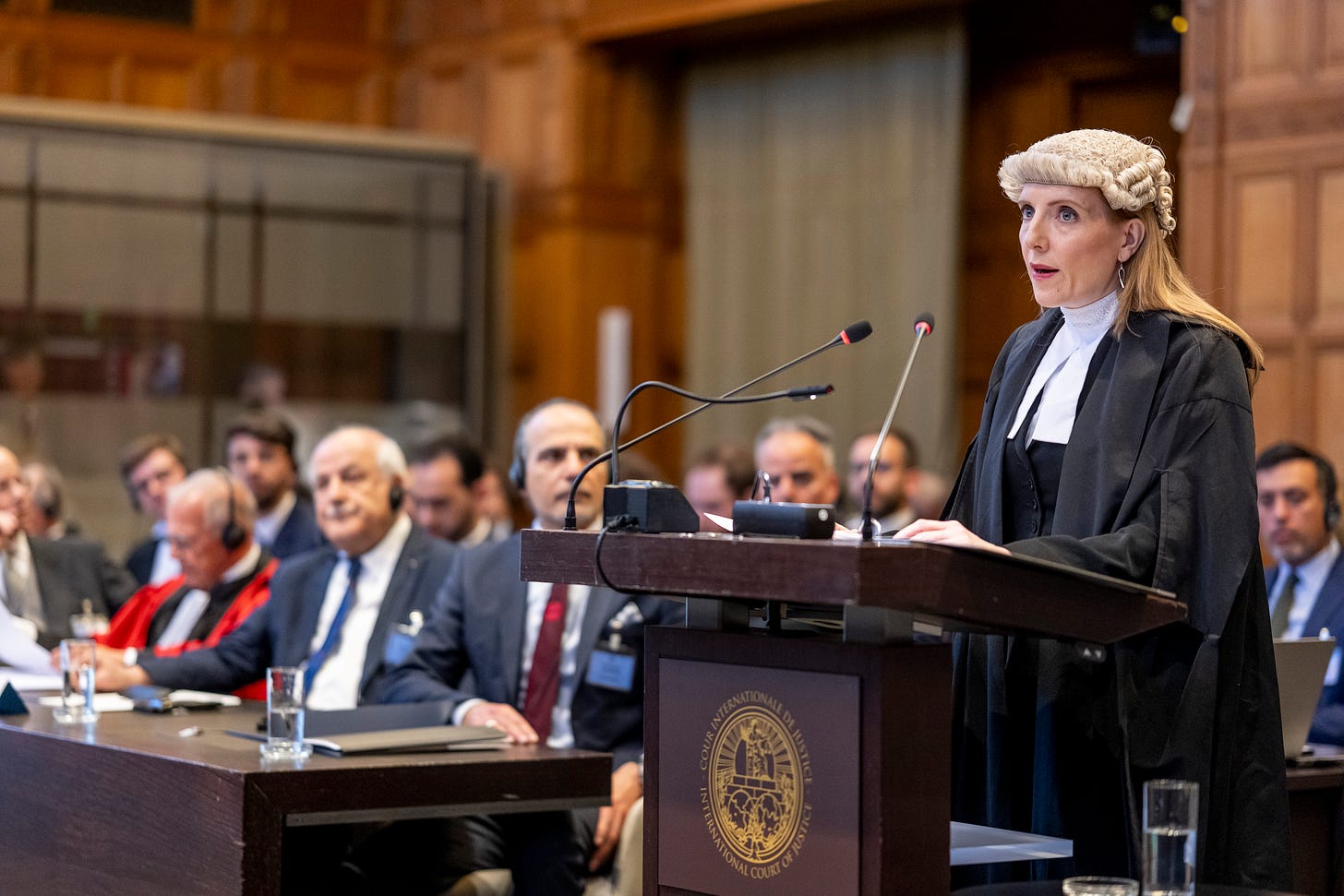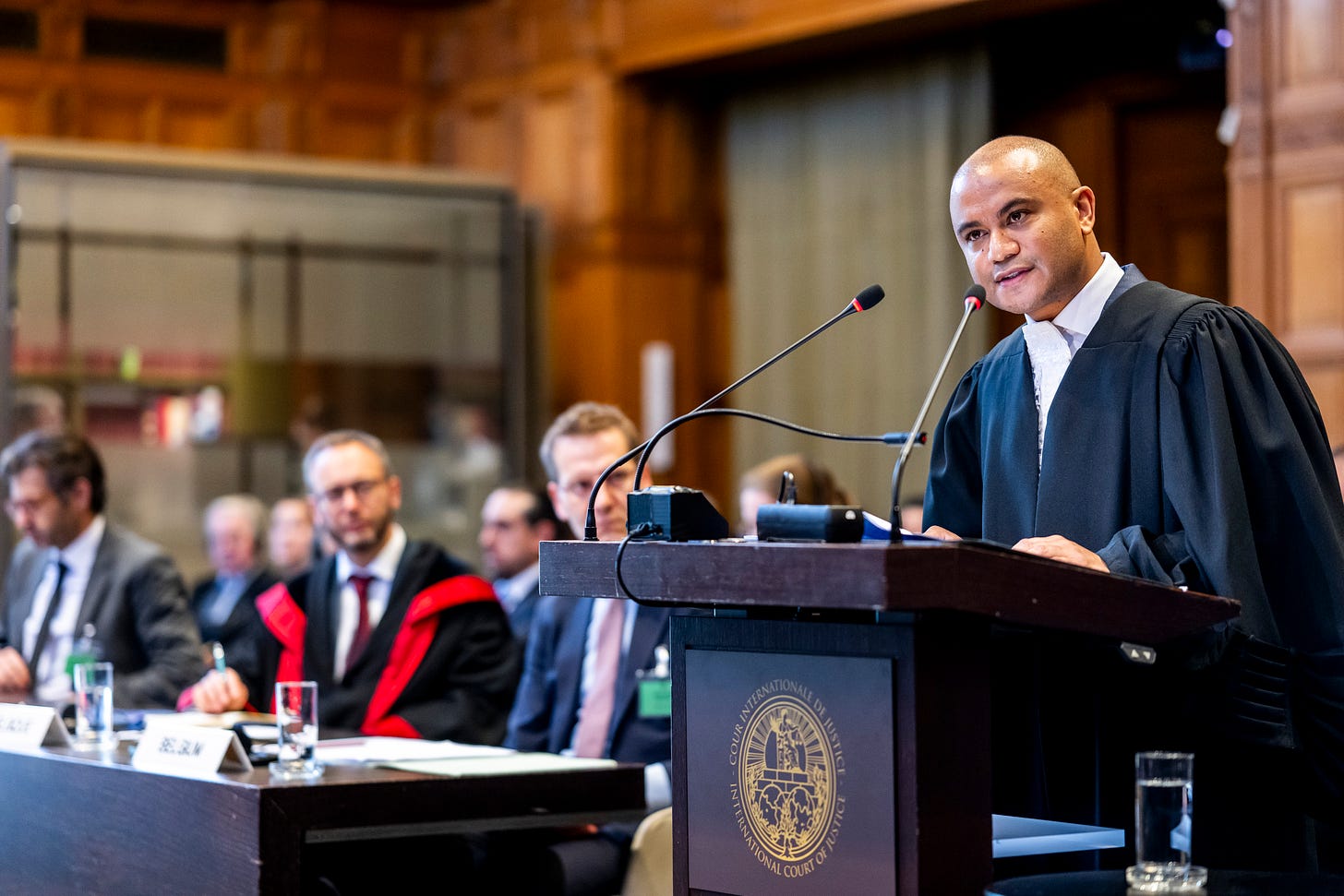World Court hears pleas for justice and humanitarian aid for Palestinians
Over five days in The Hague judges at the International Court of Justice (ICJ) heard submissions by representatives of 39 states, the United Nations, and three other international organisations about Israel’s obligations in and in relation to the Occupied Palestinian Territory (OPT).
In their submissions, lawyers, ambassadors, and other representatives spoke of the horrors that the Palestinian people continue to endure, the toll of deaths and injuries in Gaza, the destruction of healthcare and other facilities, and the starvation of the population.
Hajer Gueldich, speaking for the African Union, said: “These are indeed grave times. For over a century, the Palestinian people has endured a succession of Nakbas.
“Today, the humanitarian situation in the Occupied Palestinian Territory ... which was already beyond imagination, has become even more tragic, not to say apocalyptic.”
The presentations were very much focused on Israel’s ban on aid operations of the United Nations Relief and Works Agency for Palestine Refugees (UNRWA) in the Occupied Palestinian Territory.
During the ICJ hearings, only the United States and Hungary defended Israel’s ban on UNRWA.
Israel alleges that 19 out of about 13,000 UNRWA staff took part in Hamas’s attack in southern Israel on October 7, 2023.
Amy Sander, speaking for the Maldives, told the ICJ judges that the UN had found, through two separate investigations, that the evidence showed that Israel's allegations against UNRWA were unfounded.
Naomi Hart, also speaking for the Maldives, told the ICJ judges that Israel had “underlying and independent treaty obligations to accord privileges and immunities to UNRWA and its personnel”.
On the first day of the hearings, the Permanent Observer of Palestine to the United Nations, Riyad Mansour, made an impassioned presentation.
“We are proud of being Palestinians,” Mansour said. “Being Palestinian comes with its share of pain, and it has never been more painful to be Palestinian than today.”
Mansour urged the ICJ judges to help deliver justice in Palestine. “Help us to move in that direction and to have justice for the Palestinian people,” he said.
He told the ICJ judges: “Israel annexes our land. It kills, dispossesses, and displaces to destroy our people. It steals our resources and revenues. It fragments our territory. It severely restricts our movement and access.
“From the 18-year blockade over Gaza to the nearly 1,000 military checkpoints and obstacles to access and movement in the West Bank, to the attempts to sever East Jerusalem from its Palestinian environment. Israel systematically created our dependency on aid and then deliberately deprived us of this aid.”
The ICJ hearings were in response to a request from the General Assembly of the United Nations for the ICJ’s advisory opinion on “the Obligations of Israel in relation to the Presence and Activities of the United Nations, Other International Organisations and Third States in and in relation to the Occupied Palestinian Territory”.
They concluded on May 2 with presentations by representatives of the League of Arab States, the Organisation of Islamic Cooperation, and the African Union.
Mohamed Helal, speaking for the League of Arab States, told the court: “To address this continuing tragedy, we have offered a vision of peace and prosperity for our troubled region. Our overtures of peace, including the 2002 Arab Peace Initiative, envision a future of a free and independent State of Palestine living alongside Israel under international law, but Israel has consistently failed to seize this opportunity for peace.”
Israel's political leadership had shown that it was not a credible partner for peace, Helal told the court.
“Indeed, Israel has now launched an offensive against the UN, civil society and other states that have been moved to aid the Palestinians out of a realisation that never again is now, and that history will neither forgive nor forget those who stood aside as Israel's onslaught continues to unfold in Gaza and throughout the OPT,” he said.
Monique Chemillier-Gendreau, speaking for the Organisation of Islamic Cooperation, told the court: “By infringing upon its obligations, Israel is impairing the rights of a people to the point that it is programming the death of that people.”
She spoke of a “deluge of breaches by Israel of its international commitments”.
She told the judges: “To the contrary of what has been purported here by some delegations, Article 2, paragraph 5, of the [United Nations] charter cannot be interpreted restrictively, and the assistance of states is required for all actions of all organs of the United Nations and, as a consequence, of UNRWA.”
Measures taken by Israel against UNRWA were also a breach of the provisions of the 1946 Convention on the Privileges and Immunities of the United Nations, Chemillier-Gendreau said.
“In withdrawing the specific agreement made with UNRWA in 1967, Israel is in breach of its obligation to begin prior negotiations before calling any agreement into question and, at the same time, this termination of a bilateral agreement has no effect in substance, because Israel remains bound by the 1946 convention to which it is a state party,” she added.
Documents established by the UN highlighted how Israel has set itself against UNRWA personnel, Chemillier-Gendreau said.
“Many have been killed, some thrown into mass graves, others tortured while detained. Convoys carrying relief, personnel, and supplies have been impeded,” Chemillier-Gendreau told the court.
“Vital missions were targeted. Goods and supplies were damaged. Those that were imported were illegally taxed. Healthcare and education centres have been attacked. UNRWA staff or personnel has been threatened with criminal prosecution.”
Chemillier-Gendreau said that the Palestinians had seen all of their ordinary human rights gradually disappear.
“Gone is the right to freedom of movement, the right to work, the right to educate one's children, to health. Gone is the right to life,” she said.
Chemillier-Gendreau told the court that Israel was moving from “an increased risk of genocide”, as the ICJ had rightly warned against in its last order, “to the reality of genocide”.
Hajer Gueldich asked: “What words would be suitable to do justice to the 51,000 Palestinians, including 15,000 children, who have already lost their lives, often in dire circumstances?”
Even the bulldozers necessary to find the survivors had been methodically and systematically destroyed by Israel, she told the court.
“Israel has failed to abide by its legal obligations identified by the court in its advisory opinion of 2024,” Gueldich said.
“Worse even, Israel has redoubled its efforts to make living conditions in the Occupied Palestinian Territory impossible. It has decided to ignore its own obligations as an occupying power to guarantee the individual and collective human rights of Palestinians.”
Mamadou Hébié, also speaking for the African Union, said: “Israel must not simply agree to relief schemes by third states and international organizations. It has no power to decide. Instead, Israel must respect the Palestinian people's right to engage in international relations and to enjoy the benefits of international cooperation and solidarity.”
Israel must not simply ensure public health and hygiene in the OPT, Hébié said. “Instead, it must ensure the effective enjoyment by the Palestinians of their right to health,” he told the court.
“Israel cannot put the Palestinian people in a predicament where its very existence and its right to economic, social and cultural development are constantly in question and push or force away the international community.
“As an occupying power, it must remove all impediment to the conduct by third states and international organisations of diplomatic relation with the Palestinian people, and facilitate all actions to support them in the enjoyment of their individual and collective rights.”
Makane Moïse Mbengue, speaking for Senegal, said Israel was under an obligation to assist and facilitate the presence and activities of the UN, other international organisations, and third states acting in accordance with international law in the Occupied Palestinian Territory.
The obligation of assistance that was being discussed imposed more than passivity, Mbengue said. It was about support. "Everything must be done, not only to support the action of the United Nations and other humanitarian stakeholders but also to facilitate their work," he said.
Legal adviser to China's Foreign Ministry Ma Xinmin said Israel had an obligation to agree to humanitarian assistance from third parties when the population in the Occupied Palestinian Territory was inadequately supplied. This, he said, was not a discretionary choice.
"In Gaza and throughout the occupied territories we are witnessing an unprecedented humanitarian crisis threatening to overwhelm an already suffering people," he told the ICJ judges.
Refusing such assistance could constitute the denial of humane treatment of civilians, or a form of collective punishment, both prohibited under international law, Ma Xinmin added.
The ICJ had affirmed that Israel, as the occupying power in Palestine, had an obligation not to impede the Palestinian people from exercising their right to self-determination, Ma Xinmin said.
He told the ICJ judges: “Ultimately, the fundamental solution to the Palestinian question lies in the implementation of the two-state solution."
Joshua Simmons, a legal adviser from the US State Department, argued that there was “no legal requirement that an occupying power permit a specific third state or international organisation to conduct activities in occupied territory that would compromise its security interests”.
He said it was clear that Israel had no obligation to permit UNRWA specifically to provide humanitarian assistance in Gaza.
Simmons asserted that UNRWA was not the only option for providing humanitarian assistance in Gaza, but UNRWA has repeatedly stated that there are no other organisations that could fulfil its mission there.
In his presentation, Simmons homed in rapidly on Hamas, Israeli hostages, and Israel's security needs since October 7, 2023.
Speaking for Hungary, Ambassador Gergő Kocsis also homed in on October 7, 2023, saying that the “horrendous terrorist attack conducted against Israel by Hamas” was a turning point.
“Hungary strongly condemns these horrific terrorist attacks and calls for the immediate and unconditional release of all hostages,” he said.
Kocsis asserted that UNRWA had failed to maintain neutrality, committed a serious breach of the principle of impartiality and had failed to act in accordance with the principles enshrined in the UN charter.
He said Hungary had put forward four “compelling reasons” why the ICJ should not render the advisory opinion requested.
Speaking after Simmons, Maksim Musikhin from the Russian Federation’s Ministry of Foreign Affairs told the court that UNRWA’s work was crucial for the Palestinian people and the agency was supported by the majority of the international community.
“The urgency of this matter cannot be overstated. Gaza balances on the brink of famine. Hospitals lie in ruins. Millions of Palestinians in the [Gaza] Strip, as well as in the West Bank and East Jerusalem, face existential despair,” Musikhin said.
Like the US representative on Day 3, the representative of the UK, Sally Langrish, began her submission to the ICJ on May 1 with a reference to Hamas (condemning its “outrageous actions” on October 7, 2023) and the Israeli hostages (the “unimaginable cruelty” they had endured).
Langrish went on to say that Israel must facilitate full, rapid, safe, and unhindered humanitarian provision to the population of Gaza, including food, water and electricity, “and must ensure access to medical care in accordance with international humanitarian law”.
Langrish added: “The United Kingdom considers that UNRWA is an impartial humanitarian organisation for the purposes of Article 59 of GC4 [the Fourth Geneva Convention]. Insofar as impartiality is understood as meaning neutrality, UNRWA also satisfies that requirement.”
She also referred to Article 55 of the Fourth Geneva Convention. “Pursuant to Article 55, an occupying power has a duty to ensure the food and medical supplies of the population to the fullest extent of the means available to it,” she said.
“Where the resources of the occupied territory are inadequate, the occupying power comes under an additional obligation, in particular, to bring in the necessary foodstuffs, medical stores, and other articles.
“This extends to bringing supplies necessary for an adequate standard of living, including clothing, bedding and shelter.”
Speaking for Qatar, Mutlaq Al-Qahtani told the ICJ judges that Israel even used commercial billboards around the world and paid Google ads to spread misinformation about UNRWA, painting it as a terrorist organisation and calling for its dismantlement.
Syed Haider Shah, ambassador to the Netherlands, speaking for Pakistan, said that Israel's conduct towards UNRWA reflected one of the most significant breaches of the privileges and immunities of an international organisation in the history of the UN.
Israel's behaviour towards UNRWA was a threat to UN operations globally and should be treated as such by the ICJ, Haider Shah added.
“UNRWA must be permitted to continue to carry out its life-saving work,” he said. “Millions of Palestinian lives depend on it.”
Israel's claim that UNRWA had been infiltrated in any meaningful sense by militants was risible, Haider Shah said, and examples that Israel presented in support of its position should be read against the background of its “proven propensity to dissemble” if this served its interest.
Haider Shah cited the words of a senior UN official who described the situation of Palestinians in Gaza as “an endless cycle of blood, pain, and death”.
Iran’s Deputy Foreign Minister for Legal and International Affairs, Kazem Gharibabadi, asked: “How much more must the world witness before recognising the genocidal intent behind these atrocities, including the infliction of severe bodily and mental harm, the deliberate imposition of conditions calculated to bring about Palestinians’ physical destruction?”
Speaking for Jordan, Eirik Bjorge told the ICJ judges that the immunity of UNRWA from every form of legal process and the inviolability of its purposes were absolute and may not be qualified or overridden by military expediency or national security.
Bjorge said: “Israel has an absolute obligation to respect the privileges and immunities of the United Nations.”
He added: “Israel, self-evidently, has an obligation, inter alia, not to enter UNRWA premises, not to damage or destroy such premises, not to detain UNRWA stuff without charge or trial, and not to seek to extirpate the agency from the Occupied Palestinian Territory.”
Speaking on Day 1, Riyad Mansour said Israel’s aims were “to entrench its unlawful presence, to deny us our right to self-determination, to dispossess, displace and destroy our people, to colonise and annex our land”. Israel, Mansour said, was openly confessing to these goals.
“Kill and displace; destroy to replace. Get rid of Palestinian demography to seize Palestinian geography,” he told the court. “The methods are illegal and inhumane. The real objectives pursued are unlawful and the means deployed are criminal.”
Mansour’s emotions come close to the surface when he speaks about the suffering of Palestinian children.
“We want life and liberty and dignity in our land and in our children’s lifetime,” he told the court.
“Instead, our children are being killed, orphaned, amputated, traumatised, displaced, humiliated, witnessing and enduring what no child should witness or endure. Those who survive will never fully recover from this nightmare.”
Palestine’s ambassador to the Netherlands, Ammar Hijazi, told the ICJ judges that Israel was attempting to destroy Palestinian people and erase Palestine, including by barring and obstructing humanitarian organisations, thus also violating its obligations under the UN Charter and other instruments of international law.
“As I address you today,” Hijazi said, “the Palestinian people are being starved, bombed and forcibly displaced by Israel, their unlawful occupier. Israel has not allowed food, water, medicines and medical supplies, or fuel into Gaza for the past two months, a policy supported by the highest court in Israel, which rejected petitions to allow aid into Gaza.”
He told the court: “Starvation is here. Humanitarian aid is being used as a weapon of war. All UN-supported bakeries in Gaza have been forced to shut their doors. Nine of every ten Palestinians have no access to safe drinking water.”
Hijazi added: “This legal and moral crisis is not 18 months old. Israel has been systemically dispossessing, uprooting, slaughtering, and imprisoning Palestinians in absolute, flagrant disregard for international law and the inalienable rights of the Palestinian people for 80 years now.
“It has done so with the intent to destroy our people and to thwart their realisation of self-determination in their homeland.”
Also speaking for Palestine, Irish barrister Blinne Ní Ghrálaigh told the ICJ judges: “Israel’s acts are not just murderous and inhumane, they are genocidal, as the UN Commission of Inquiry and others have concluded, and as is the near consensus view across the human rights community.”
Ní Ghrálaigh cited Israel’s numerous violations of the ICJ’s orders. “Israel continues to block UN-mandated investigatory bodies from Gaza while destroying and burying evidence of its crimes,” she said.
“Despite the extraordinary efforts of Palestinian journalists, who are themselves repeatedly targeted and killed, so much remains undocumented.”
Ní Ghrálaigh said Israel was “egregiously breaching its obligations to respect the inviolability of UN premises and the immunity of UN premises, property, and assets” and was in egregious breach of its obligations to respect the privileges and immunities of UN officials.
Israel’s violations included its use of UN premises as military bases and its violent, lethal attacks on UN schools, shelters and healthcare facilities, which had been a feature of every large-scale military assault on Gaza since at least 2009, Ní Ghrálaigh said.
Since October 2023, Israel had attacked more than 310 UN facilities in Gaza, striking many repeatedly, she added.
“Israel violates the immunity of the UN officials, including by killing, injuring and unlawfully detaining them and subjecting them to violent interrogation and ill-treatment, including severe beatings, waterboarding, deprivation of food and water, and threats of extreme harm to their families,”Ní Ghrálaigh said.
She added: “Approximately one million children are being impacted particularly severely. Children are literally freezing and starving to death. They include 79 children, including eight newborn babies, who died during the particularly harsh cold weather of Christmas and New Year gone by.
“Gaza is now home to the largest cohort of child amputees in the world, the largest orphan crisis in modern history, and a whole generation in danger of suffering from stunting, causing irreparable physical and cognitive impairment.”
More than 15,600 Palestinian children had been killed violently in Gaza, Ní Ghrálaigh said.
“Tens of thousands more of Gaza’s children are injured or missing and many of those surviving are so traumatised that they openly express the wish to die,” she told the court.
Also speaking for Palestine, Paul Reichler told the court that “killing and maiming hundreds of thousands, and starving and attempting to displace millions of Palestinians out of Palestine, amounts to no less than destroying them as a group”.
Speaking for South Africa on Day 2, legal adviser Jaymion Hendricks told the ICJ judges: “Despite the horrific attempts by Israeli officials to characterise them otherwise, Palestinians are human beings. They are flesh and blood.
“Palestinian people are entitled to the same fundamental protections as we in this Great Hall of Justice, and this includes the right not to be arbitrarily deprived of life, the supreme right from which no derogation is permitted, even in situations of armed conflict.”
Hendricks added: “South Africa shares the UN secretary-general's view that the world has failed the Palestinian people. The only certainty they have is that tomorrow will be worse. Therefore, we must save whatever is left of our humanity by ending Israel's unlawful settler-colonial occupation and its intentional starving of the Palestinian population, who are being systematically brutalised and deprived of the most elementary considerations of humanity.”
Hendricks concluded South Africa's submission to the ICJ saying: “Palestinians look to the world and to this court for an end to their enduring loss, their pain, and their suffering.”
The UN’s Under-Secretary-General for Legal Affairs and UN legal counsel, Elinor Hammarskjöld, spoke at the start of the hearing on the first day.
“In the advisory opinion of 19 July 2024 this court concluded that Israel’s assertion of sovereignty over and its annexation of certain parts of the Occupied Palestinian territory constitute a violation of the prohibition of the acquisition of territory by force,” she said.
“On this basis the court has authoritatively determined that Israel is not entitled to sovereignty over or to exercise sovereign powers in any part of the Occupied Palestinian Territory on account of its occupation.”
Israel did not participate in the hearings and made its submission in a 38-page written statement.
It said that the latest case concerning Israel brought before the ICJ was “part of an abusive and systematic campaign that regrettably weaponises international law, and international legal institutions, with the aim of depriving Israel of fundamental rights accorded to all sovereign states, including the right to defend itself”.
This article is also available on my Changing Times website.
All my articles are freely accessible, but I do need the support of my readers. If you like my articles, please do share them. If you wish to support my work financially with a donation please click this PayPal link.
If you would like to take out a paid subscription to my Changing Times website, there are PayPal subscription buttons on the website.
Thanks to all those who already support me and thanks in advance to those who will be supporting me in the future.
